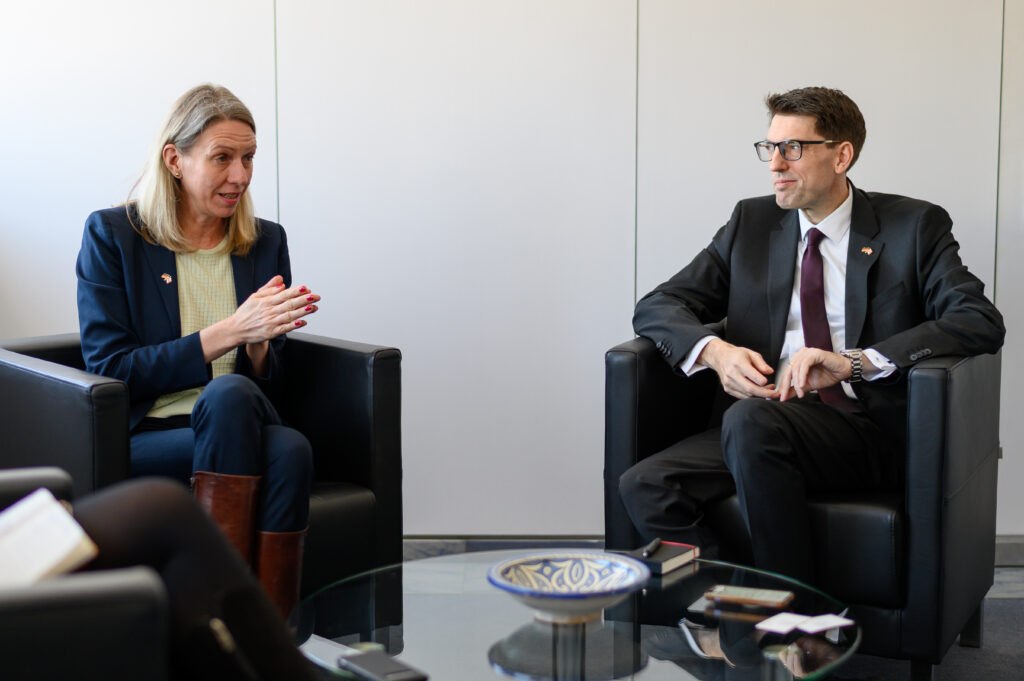QUESTIONS ASKED
German ambassador
‘We are in a race against time, given a very acute Russian threat in Europe.’
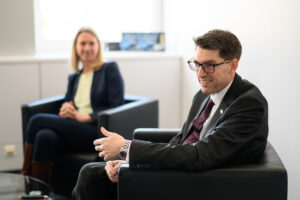
Tjorven Bellmann and her husband Matthias Luettenberg share a lot. Among those things are three children, a professional interest in international affairs and, as it turns out, a job. The married couple is in Canada as co-ambassadors from Germany. The arrangement, part of the German foreign ministry’s efforts to be more family-friendly, has one of them serving as ambassador for eight months, while the other stays home and looks after their children, aged 11, 13 and 16. And then they switch. Only the person on the job at that time gets paid. They sat down together with Diplomat magazine editor Jennifer Campbell just as Bellmann was winding down her first eight-month stint. As such, she took the lead on answering the questions.
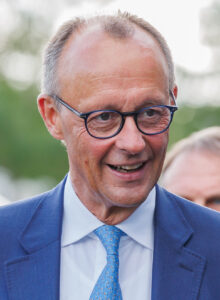
Diplomat magazine: Your federal election took place on Feb. 23. It looks as though the Conservatives [CDU/CSU] and Social Democrats [SPD] will form a coalition government led by Friedrich Merz, but the Alternative for Germany Party [AfD] made considerable inroads by coming second and taking 20.8 per cent of the vote, particularly in the east. What does this tell you about German society at the moment?
Tjorven Bellmann: First of all, I think there’s a clear mandate for a possible coalition between the Conservatives and the Social Democrats, which are in talks right now to form such a government. You will have seen that before they’ve even formed the government, both parties made an important announcement this week about an attempt at reform of our debt brake and setting up a new 500-billion-euro fund for infrastructure. Both of these measures would require constitutional change, and require a two-thirds majority of Parliament, and talks are underway now to generate that. In terms of the signal that those parties that are to form the next German government are sending, they are cognizant of the extraordinary times we live in and are ready to take over the leadership that is expected of them. Of course, the fact that one fifth of the vote went to a party that is under supervision by our internal intelligence services is something that we need to address. The fact that young voters showed that they are not happy with some of the politics that the current government undertook — that’s a task for the next government to address and make sure that we offer policies that are convincing.
DM: Does the rise of the AfD mean Germany will be pressured to soften its pro-EU, pro-NATO stance at all?
TB: I don’t see that happening. I mean, the parties that will form the next government are strong supporters of EU and NATO, and will be leading in both these organizations.
DM: Chancellor-in-waiting Friedrich Merz said this week that “in view of the threats of our freedom and peace to our continent, whatever it takes, must now apply to the country’s defence.” Canada and Germany are both spending below NATO’s two per cent target. What strategy will Germany, as Europe’s largest economy, consider to hit and exceed the two per cent benchmark?
TB: We’re actually at 2.1 per cent in defence spending at the moment, according to NATO criteria, so that’s not a problem we face, but it is clear that we need to do even more for our defence. You will recall that the current, still incumbent government, set up one $150 billion [Cdn.] special defence fund in order to re-arm our armed forces. That money will last until 2027 and the next government will have to ensure that the investments we took are sustained, because with re-arming, a lot of the weaponry investments are long term, long term. And this is why the parties that are in all likelihood going to form the next general government took this decision. This means that any defence spending above one per cent GDP will not count against the debt rules — what we call the debt break, which is a strong limit on making debts for the government. So that’s part of the reforms they are attempting. Of course, this still has to go through Parliament.
DM: Your government will also have to be focused on stimulating the economy and preventing a recession. Is Trump’s latest defence spending demand of five per cent of GDP, in spite of the U.S. only spending 3.4 per cent, even possible?
TB: First, in terms of the next government, if it is formed, will want to address the economy, the proposal for a 500-billion-euro special fund for infrastructure is one of the answers to that question, if it is voted into law. In terms of what future NATO defence spending targets will look like, we are very cognizant of the fact that two per cent will not be enough anymore. This is not because of some artificial figure of GDP or because of U.S. demands, it’s because of the security threat we face in Europe. We are in a race against time, given a very acute Russian threat in Europe. You will have heard a debate in Germany — and that’s one of the issues the next government will address — of reintroducing conscription. And all of that is because we see what’s happening on the Russian side, how the Russians are re-arming, doubling their military forces and clearly preparing for a possible confrontation beyond Ukraine. That’s something that European leaders and German leaders take very seriously. And this is why, if we want to underpin the defence plans we have with capability — and that’s really what it’s all about — and you make the calculation of what that will cost, you will end up significantly higher than two per cent and this is what the discussion should be about. What exact percentage NATO leaders will end up with — that’s a decision that has to be taken by the heads of state and government of the NATO Alliance. We have a summit this June in The Hague so I would expect discussions to start around where we end up at that summit.
DM: Trump has suggested he’d like Europe to enforce a settlement between Ukraine and Russia, without U.S. backing, while Europeans meet to try to come up with a plan of their own. Where do you see that ending up?
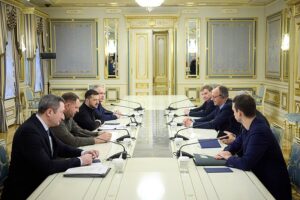
TB: The German government has said time and again that any settlement regarding Ukraine, first and foremost, has to be in the hands of the Ukrainians. We will never accept any dictated arrangement. European leaders and the Ukrainian president have been very clear that we need a settlement that really ends this war and not something that is just a prelude to the next aggression. And this concerns questions like territorial integrity, security guarantees, the size and might of future armed forces in Ukraine, political sovereignty and choice of alliances. Putin could end this war today, if he wanted to, but we don’t see any serious readiness on the Russian side to even engage in serious talks. All of what we see and the answers that the Russian president has given these past days and weeks is only more aggression and bloodshed and continuing the war. All of us want this war to end — nobody more than the Ukrainians — but it has to end in a way that brings true peace and not the next aggression.
DM: And Europe will be leading that?
TB: You saw already a series of meetings by European leaders and including Canada’s prime minister on these issues. We’ve had several summit-level meetings on Ukraine these past days and weeks. Early yesterday, we had an extraordinary European Council where European leaders sat around the table to discuss how Europe can ramp up defence production, both in terms of our own defences, but also in view of continuing to support Ukraine. This morning, the leaders, the president of the European Council, the president of the European Commission and the high representative for foreign policy sat down in a video conference with non-EU NATO allies, including Prime Minister Trudeau, but also the president of Turkey, the British prime minister and others, to debrief them on these plans and talks. There is a new very close co-operation in ad hoc formats to address the shortfalls of the regrettable decisions by the American government to stop sending military support to Ukraine. You will also have seen that the German and British defence ministers have decided to co-chair and continue the important work that was done with a defence minister support group for Ukraine. I think the message is very clear that we will step up and we will continue this support, because it’s the right thing to do, and it’s a matter of our own security as well.
DM: Moving on to Canada, what are the top three goals for you as Germany’s co-ambassadors to Canada?
Matthias Luettenberg: I’ve never really thought about the top three, but there were some issues which were very dear to our mind, even before we came. One of them is the trade relations between our countries, but I think our focus has changed a little over time, and especially now, after the elections in the U.S. and everything that comes from that. I think we feel even closer to Canada as a partner of values, as a partner in the Western world, because we see that our international order is under attack and that we have to be closer. And I think this is something which is added on our to-do list, and it’s a very good feeling to give this reassurance to the Canadians that we want to work together, in view to Ukraine, but also when it comes to stabilizing our international rules-based order. And I think that Germany and Canada are partners for sure. Another item that came to my mind is our brilliant science co-operation between Germany and Canada, which is going far beyond what I had expected. From the Arctic to the universities and back and forth, this is a real asset that we have.
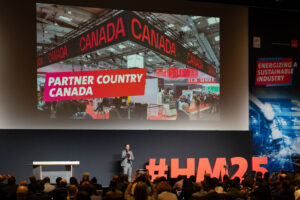
Hannover Messe Preview 2025
TB: The third to me would be our military co-operation. And all of these three, I think, are very concrete at the moment. In terms of trade, we have CETA, which has increased trade significantly between the EU and Canada — up 65 per cent or so — and Germany and Canada up 43 per cent. But there is still potential for more. We will have Hanover Messe end of this month, which is the biggest industrial technology trade fair in the world, and Canada will be the official partner country this year, so 1,000 Canadians will come to Hanover and more than 250 companies. It’s a huge fair. You can walk an hour if you don’t stop anywhere — that’s how big it is. It’s five million handshakes in five days. So that’s very exciting.
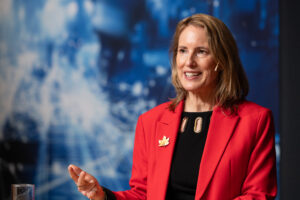
If you talk about diversification of trade, this is how it can be done concretely. In terms of science, also, there is a science[component, as a lot of universities will be at Hanover Messe, because the whole R and D aspect a very critical element in trade as well. And AI is a big topic at the fair as well. The 15 leading Canadian universities have just been meeting the 15 leading German universities. It’s amazing how much co-operation there is on very exciting areas, like quantum technology and AI.
On military cooperation, we’ve had an unprecedented level of high-level visits. This year alone, we had the deputy defence minister here, we had our chief of defence here. We had our chief of the army here and just this week, we had our chief of the navy here for the Ottawa security conference. And all of them tell me that never before had co-operation with Canada been so close.
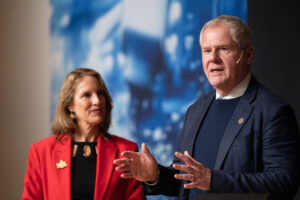
Our armies are serving next to each other in the Baltic countries. Canada, as you know, has the battle group in Latvia and we are setting up a fully-armed permanent combat brigade in Lithuania, and that has triggered a lot of co-operation between us, because they co-ordinate how they exercise, how they do everything. The navies have just decided to have talks bilaterally and last summer at the NATO summit, we set up a trilateral co-operation with Norway, Canada and Germany, with Norway on maritime security in the North Atlantic. Part of what they will go into is maritime aerial surveillance. We all fly the same maritime patrol aircraft, and they will discuss how to co-ordinate on situational awareness and things like that.
DM: We’ve also read recently about Germany and Norway offering Canada early access to new diesel-electric submarines.
TB: If Canada were to decide on the German-Norwegian option, then you can see how big the potential is to increase this nascent co-operation even more. The offer from our side is on the table. It’ll be the most modern conventional submarine that will be on the market then. The first one comes in 2029 and will be all NATO certified — no Chinese products in there — and everything will be ready to become not only interoperable, but interchangeable.
DM: With respect to the tariff threats from the U.S., do you think Merz will look inward to the EU or try to change Trump’s mind, or both?
TB: The next German government will be a strong European leader and will work hard to unify Europe and and lead European policy, but that doesn’t mean that it’s inward-looking. Of course, the trans-Atlantic relationship, both with the U.S. and with Canada for us is vital and will remain strong. We all know that we are faced with challenges with this American government, and it’s the same challenges, essentially, for Canada and for us. I mean, it’s the tariff policy we all believe is unjustified and not helpful for American consumers in the end. It’s our security alliances that we need to remain strong and things like the Ukraine war and how we want to bring it to an end. The challenges are the same. I’m sure the next government will continue as the past government has done, to co-ordinate very closely with our Canadian friends. And the current government has made very clear that we don’t believe these tariffs are in any way justified, that we believe the trade war will lead to [consequences] that are deeply unhelpful. We want to do more trade, not less. And in the end, it’s our consumers and all of us who will pay the price, but it’ll be American consumers as well.
DM: We talked a little bit about the Canada-Germany relationship. On trade, where is the room for growth?
TB: CETA is still underused, and if Canada would seriously take steps in terms of getting rid of non-tariff barriers to internal trade in Canada, that [would make] your market more attractive. And also, if you’re seriously to look into diversifying trade, we, as Europeans and as Germans, want to be part of that answer. So that’s definitely an area where I see potential. Critical minerals are a subject where there’s potential for increased co-operation. Canada has everything in the ground that Europe needs. The challenge so far is to get it out of the ground, so it’s a question of investment, it’s a question of procedures. I think that’s a discussion we need to have. Germany set up a special raw materials fund last year, under which Canadian companies can apply for co-funding or an investment into equities by our bank for reconstruction. We hope that some concrete co-operation can come out of that. There is still an energy piece that I think has potential. We will continue to be interested in your hydrogen, especially green hydrogen. There are other parts of Europe that will also be interested in LNG. Germany, at the moment, has enough LNG, but we will see how that develops in terms of energy needs in the future. The military co-operation, as we discussed, I think, has huge potential for more.
ML: We do see a lot of interest by German companies in the most modern technologies — from battery production or semiconductors or carbon catching technology. We see huge potential for more investments from Germany.
TB: In all truth, a lot of investment potential for both countries will depend on where the trade piece goes from here. If both countries are faced with large tariffs, that will limit the investment power companies have. Our hope is to put an end to this and use the investment opportunities that our companies have for things that will generate growth for all of our citizens.
DM: What sort of non-tariff barriers would you have Canada eliminate?
TB: As far as I understand it, it’s mostly regulatory discrepancies so different regulations in provinces with regard to movement of vehicles, movement of people, standards. We’ve gone through harmonizing all of that in Europe with 27 different countries. So it’s maybe something to look at how we managed to do this. I sense an earnest willingness from a lot of premiers to address this question, which has been discussed for years now. And I think that’s a very encouraging development.
DM: Are there other concrete ways — low hanging fruit — on which we could be co-operating?
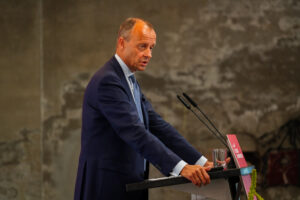
TB: We’re already co-operating on a joint support ship where the Canadian side has bought the design of the German side, and that will go to production. We are also co-operating on the industry side and the development of an anti-torpedo torpedo for submarines. That’ll be a very groundbreaking development. If you are on a non-nuclear propelled submarine, that’s the kind of weapon you want to have to fight against a nuclear-propelled submarine that potentially is faster than you are. Also, our frigate [procurement program is] buying certain communication systems from Canada, so it goes both ways. And, of course, with the submarine deal, if it came to bear, the maintenance will have to happen also in Canada, which is something all sides are clear about. And that in turn will establish a supply chain that will bring a lot of investment and a lot of business opportunities for Canadian companies. We also can imagine closer co-operation in the Indo-Pacific. We’ve taken up a bigger role there. And Canada is a Pacific nation, too. I can also imagine more co-operation in the Arctic. But that is in the hands of the Arctic nations, who will have to guide us on how much co-operation you want from non-Arctic nations.
DM: Speaking about the threat that Russia poses, in Eastern Europe, particularly, can or will Germany do anything outside of NATO?
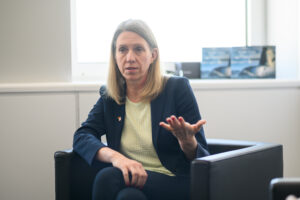
TB: When we set up the brigade in Lithuania, part of that was not formally inside NATO structures. It has now been incorporated into NATO structures, so we’ve shown that we can be flexible and move ahead, even if NATO policy isn’t at the same pace. It’s important for us to keep NATO intact and credible, and we will do everything to ensure that this defence alliance, which has been so successful for the past decades, will remain successful for hopefully many decades to come. At the same time, it’s clear that we have a renewed debate on increasing all of our defence setup. The German defence minister and the German chief of defence have said publicly that our armed forces have to be war-ready by 2029 in order to prevent future Russian aggression by showing that the price of any such aggression would be high. It’s a question of keeping NATO as strong as possible, but in order to do this, non-U.S. NATO allies have to continue to invest even more into their armed forces and into the capabilities for these armed forces. That’s a sense that is shared between Germany and Canada, and we heard Defence Minister Blair very clearly on that at the Ottawa Security Conference.
DM: The G7 Summit happens in Kananaskis this year. What do you hope gets done there?
TB: I think first and foremost, it’s important that the G7 come to a common understanding on trade and investments, on financial questions, but also on geopolitical issues, such as the Russian invasion of Ukraine and war of aggression against Ukraine and other geopolitical issues such as the Middle East. For those leaders, this is an incredibly important group. It’s a very small room, and many of the leaders will be new. There will be a new German Chancellor. There will be new U.K. and Canadian prime ministers and there’s a new American president. It’s important that these leaders, who have so far done one phone call, sit together and discuss those most pressing issues — anything from economic security to the global crises we face.
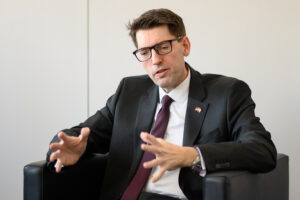
ML: I think first and foremost, it’s important that all of these leaders actually come to the table. Depending on how Canada-U.S. relations may turn out.
DM: There have been a series of attacks in Germany that seemed to be perpetrated by asylum-seekers and Merz seems to lean toward stricter immigration policies. Where do you see the new government going on this issue?
TB: It’s illegal migration that Germans are concerned about. We have a mixed policy in terms of legal migration. We are actually attracting certain types of migration — qualified labour, especially. In terms of refugees or asylum-seekers, you can see that the numbers are constantly going down. This year, [there are] more than 40 per cent fewer asylum-seekers coming to Germany than the year before. [Illegal migration] is an issue that is of concern to Germans. In the polls out of the election, the three tops topics for Germans were migration, security and the economy, so I think any government has to address these issues. Last year [we took] common decisions on the European level on migration policies that now need to be implemented. The process to put them into law is on its way and I think that the next German government will continue on this path. It’s a concern for the population that we have to get better at tracking people who are a danger to the public. And you often see in the aftermath that these people [attackers] partly were known and that there were concerns that were raised about them, and still we didn’t manage to prevent these attacks. [We also need to] make sure that those who have no legal grounds to be in the country actually leave the country. Those who have legal grounds and who are real refugees, we want to continue to protect — it’s actually part of our constitution to protect them.
ML: I think there’s broad consensus about Ukrainian refugees. We have more than one million people who came from Ukraine since the war started. This is a distinct topic, but I think it’s also important in this discussion not to confuse the two topics.
TB: The Ukrainians have special status outside the normal procedures and it’s the biggest group. There are about six million Ukrainian refugees and Germany is the biggest recipient.


